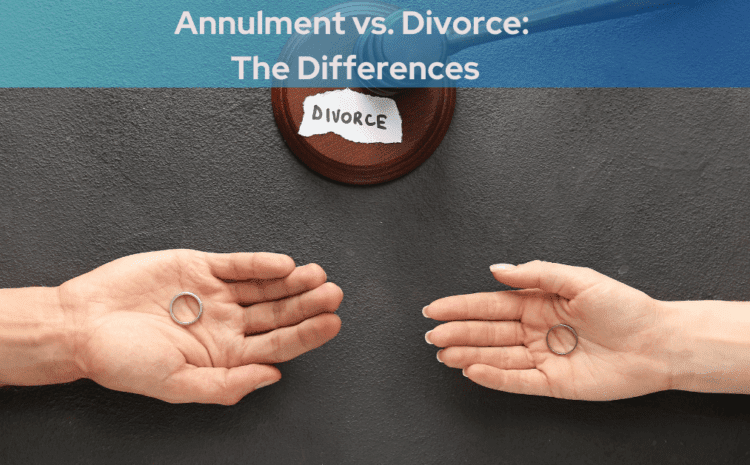
Marriage is considered sacred in India, but not all marriages last forever. When a marriage breaks down, couples may seek to end their relationship legally through either an annulment or a divorce. While both processes result in the dissolution of a marriage, they are fundamentally different in terms of their legal implications, grounds, and consequences. This blog will delve into the distinctions between annulment and divorce, highlighting relevant Indian case laws to provide a comprehensive understanding.
Annulment: Declaring a Marriage Null and Void
Annulment is a legal procedure that declares a marriage null and void as if it never existed. In Indian law, annulment can be granted under specific circumstances, which generally involve the marriage being void or voidable.
Grounds for Annulment
Void Marriages
A marriage is considered void ab initio (from the beginning) if it violates certain statutory provisions. According to the Hindu Marriage Act, 1955, Section 11, a marriage is void if:
– Bigamy: Either party has a living spouse at the time of marriage.
– Prohibited Relationship: The parties are within the degrees of prohibited relationship unless the custom permits such marriage.
– Sapinda Relationship: The parties are spindles (close blood relatives) unless the custom permits such marriage.
Voidable Marriages
A marriage can be declared voidable under Section 12 of the Hindu Marriage Act, 1955, on the following grounds:
– Impotence: If either party cannot consummate the marriage due to impotence.
– Unsoundness of Mind: If either party is suffering from a mental disorder to such an extent that they are unfit for marriage and procreation.
– Consent Obtained by Fraud or Force: If the consent of either party was obtained by coercion or fraud.
– Pregnancy by Another: If the wife was pregnant by another person at the time of marriage, provided the husband was unaware of this fact.
1. Tarlochan Singh v Jit Kaur AIR 1986 P & H 379: Concealment of the fact that the wife had schizophrenia before the marriage would lead to the grant of a decree for annulment of marriage as it amounts to a matrimonial fraud.
2. Som Dutt v Raj Kumari AIR 1986 P & H 191: The wife’s matriculation certificate and admission indicated she was older than her husband. However, a horoscope was produced to show her younger self during the marriage negotiation. She was also suffering from recurrent attacks of hysteria and garrulity; these facts were suppressed. Held, marriage was liable to be annulled for gross matrimonial fraud committed upon the husband, both about the age of the wife and her mental state.
Also Read: – Disadvantages of Dowry System
Divorce: Dissolving a Valid Marriage
Divorce is the legal dissolution of a valid marriage. Unlike annulment, which treats the marriage as if it never happened, divorce acknowledges that it existed but has irretrievably broken down.
Grounds for Divorce
The grounds for divorce in India vary depending on the personal laws governing the parties. Here are the grounds under some major personal laws:
Hindu Marriage Act, 1955
– Adultery
– Cruelty
– Desertion for a Continuous Period of Two Years
– Conversion to Another Religion
– Unsoundness of Mind
– Incurable Leprosy
– Venereal Disease in a Communicable Form
– Renunciation of the World
– Not Heard of Being Alive for Seven Years
– No Resumption of Cohabitation for One Year or More After a Decree of Judicial Separation or Restitution of Conjugal Rights
Muslim Personal Law
– Talaq: Unilateral repudiation by the husband.
– Khula: Divorce initiated by the wife.
– Mubarak: Mutual consent.
– Lian: False accusation of adultery.
Indian Divorce Act, 1869 (for Christians)
– Adultery
– Conversion to Another Religion
– Cruelty
– Desertion for Two Years
– Unsoundness of Mind
– Venereal Disease
– Leprosy
– Not Heard of Being Alive for Seven Years
Parsi Marriage and Divorce Act, 1936
– Continuous Absence for Seven Years
– Non-Consummation Within One Year Due to Wilful Refusal
– Unsoundness of Mind
– Adultery
– Cruelty
– Venereal Disease
– Leprosy
– Desertion for Two Years
– Imprisonment for Seven Years or More
– Conversion to Another Religion
1. Narendra v. K. Meena (2016) 9 SCC 455: The Supreme Court held that consistent mental cruelty by one spouse could be a valid ground for divorce. The court highlighted that mental cruelty could include abusive language, false accusations, and other forms of emotional abuse.
2. Joseph Shine v. Union of India (2018) 2 SCC 189: In this landmark judgment, the Supreme Court decriminalized adultery, but it remains a valid ground for divorce under personal laws. The court emphasized that adultery constitutes a valid ground for seeking a divorce as it affects the sanctity of the marital bond.
Also Check: – Best domestic violence lawyer
Key Differences Between Annulment and Divorce
Legal Status
– Annulment: Declares the marriage null and void as if it never existed.
– Divorce: Acknowledges that the marriage existed but has been legally dissolved.
Grounds
– Annulment: Based on specific conditions such as fraud, coercion, impotence, or violations of statutory provisions.
– Divorce: Based on reasons arising after a valid marriage has taken place, such as cruelty, adultery, desertion, or irretrievable breakdown and other grounds specified in the applicable laws.
Consequences
– Annulment: Since the marriage is considered void, there is usually no division of marital property, and issues like alimony or maintenance may not arise.
– Divorce: Involves the division of marital assets, maintenance, child custody, and other ancillary matters.
Timeframe
– Annulment: Generally pursued soon after the marriage (within a year from the date of marriage or when the fraud was discovered/ force was ceased) once the grounds are discovered.
– Divorce: This can be sought at any time after the marriage, often requiring a period of separation.
Societal and Cultural Considerations
In India, marriage is a personal relationship and a social institution with deep cultural and religious significance. The decision to seek annulment or divorce is often influenced by societal norms and the stigma associated with marital breakdowns. An annulment may be preferred (only in the presence of valid ground) in cases where parties wish to avoid the social stigma of divorce, as it effectively erases the marriage from a legal standpoint.
Legal and Financial Implications
Choosing between annulment and divorce can also have significant legal and financial implications. For instance, an annulment might be more straightforward regarding property division, as it treats the marriage as if it never existed. However, in a divorce, the division of marital assets, maintenance, and alimony are critical considerations that can impact the financial future of both parties.
Psychological and Emotional Impact
The psychological and emotional impact of annulment and divorce can vary greatly. Annulment might provide a sense of closure and a clean slate, particularly in cases of fraud or coercion. Divorce, on the other hand, may involve a more prolonged emotional process due to the legal proceedings related to asset division and child custody.
Conclusion
Annulment and divorce are two distinct legal mechanisms for ending a marriage, each with its grounds, processes, and consequences. Annulment is appropriate for situations where the marriage is void or voidable due to specific legal reasons, while divorce is sought for reasons arising after a valid marriage. Understanding the differences can help individuals make informed decisions about how to proceed when facing marital breakdowns.
Key Takeaways
1. Annulment is a legal declaration that a marriage is null and void. It is often sought on grounds such as fraud, coercion, impotence, or violating statutory provisions.
2. Divorce is the legal dissolution of a valid marriage, sought on various grounds such as cruelty, adultery, desertion, and irretrievable breakdown.
3. The choice between annulment and divorce can have significant societal, legal, financial, and emotional implications.
4. Indian case laws provide valuable insights into how courts interpret and apply the grounds for annulment and divorce.

Advocate Kiran S R – A highly skilled, passionate, dedicated advocate, with vast wealth of knowledge, professionalism, ethical approach and expert skills. One of the sharpest legal mindset brings the best principles of legal practice to the forefront. A qualified Engineer turned Advocate. His passion, dedication and vision to help and assist his clients achieve the best results is his driving force.

